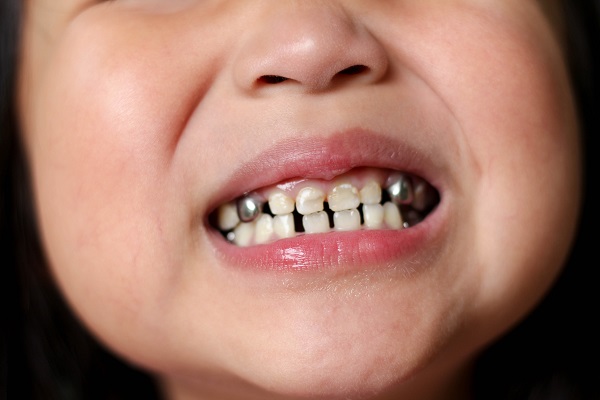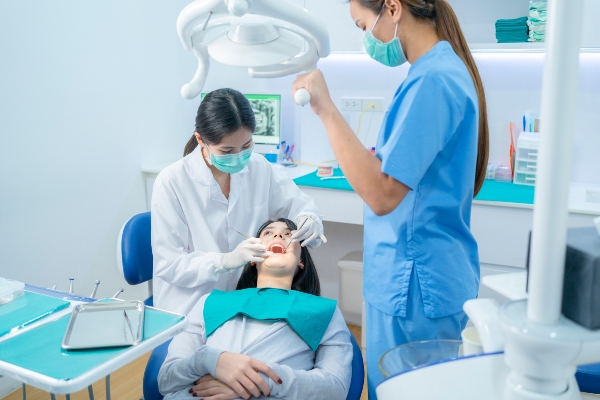FAQs About a Baby Dental Crown

If your dentist has recommended a baby dental crown for your child, you probably have questions about the procedure. A dental crown helps protect your child’s primary tooth from further damage and is often suggested when a tooth cannot be repaired with a dental filling. Here are frequently asked questions about baby dental crowns.
What is a baby dental crown?
A dental crown is a prosthetic restoration affixed over a tooth. It is created to cover a damaged tooth completely and prevent additional damage. A crown can also be used to change the shape, alignment, and outlook of a tooth. The pediatric dentist can customize a porcelain or composite baby crown to match the rest of the teeth.
Why would a baby tooth need crowns?
Many people often wonder why a child would need dental crowns, especially since the baby teeth will be lost eventually. However, baby teeth play an important role in maintaining space for incoming permanent teeth. Premature loss can disrupt dental alignment. If a child has multiple cavities on a tooth or a large cavity that cannot be repaired with a dental filling, a dental crown is the best option for treating this.
Stainless-steel crowns are usually used for baby teeth at the back, while tooth-colored crowns are used for front-row teeth. The dentist will discuss the options with the parent during the appointment.
What steps are involved in the crowning procedure?
There are universal steps for every dental crown placement. First, the dental specialist will numb the tooth and surrounding gums with a local anesthetic. This will help prevent the child from feeling pain throughout the procedure. They will isolate the tooth, remove all traces of decay, and shape the tooth to receive the crown. Unlike adult dental crowns that usually need multiple dental appointments, most crowns for children can be completed in one appointment.
What types of crowns are available for a child’s baby teeth?
Permanent crowns may be made from various materials, the most common of which are gold, stainless steel, and various alloys. There are also ceramic and porcelain-fused-to-metal crowns.
Prefabricated stainless-steel crowns are often used as a stopgap solution on permanent teeth. To prevent additional decay in a child's primary tooth, the dentist may use the crown to cover the tooth after preparing it. Since the dentist can place crowns in fewer office visits, they can be a cost-effective option for kids.
Gold alloys, palladium, nickel, and chromium are also used in crowns. Metal crowns can endure biting and chewing pressures throughout their lifespan and require minimal changes to the natural tooth structure. However, dentists usually only use these crowns on back teeth that no one can see, such as the molars, because of the dark hue of the metal.
While porcelain-fused-to-metal crowns can be customized to match the natural tooth's color, they do so at the expense of the adjacent teeth, which may show greater wear over time. Porcelain is also more likely to chip. Crowns made of porcelain or ceramic may be the best option for children allergic to metal. These two options are suitable for use on the front teeth.
When happens after crown placement?
The local anesthetic will make the child's mouth numb. Parents should not allow their children to bite their tongues, lips, or cheeks. It is best to wait until the numbness has worn off before they consume anything other than water. The child's crown may feel tight for a few days after the procedure.
If the child is in pain, the parents may give them over-the-counter medication. During the first few days, the child may have trouble eating and speaking normally. Foods that are easy to chew and swallow might be beneficial at this time. At first, it might seem like the crown is too high for the child's bite. But after a few weeks, the crown will settle and feel like a normal tooth.
How long does the crown last?
Parents can expect the baby’s crown to last as long as the primary tooth that it is on. Once the primary tooth has outlived its purpose, it will be replaced by a permanent tooth. However, if the crown is fitted over a permanent tooth, it will last much longer. Oral hygiene practices are important to ensure that the crown lasts for as long as possible.
How does one take care of a child’s crown?
Parents need to know that their child may experience sore gums for a few days after the dental crown placement. The child can be given pain relievers to alleviate the discomfort. The child’s teeth should be brushed and flossed regularly, as usual. For a tooth with a stainless-steel crown, it should have a shiny appearance after being brushed. Biannual appointments with the dentist are also essential to maintain the child’s oral health.
In conclusion
If you have additional questions about a baby dental crown, do not hesitate to contact the dental office for answers. If the pediatric dentist thinks that your child’s teeth will benefit from crown placement, they will guide you through the process so you know what to expect.
Request an appointment here: https://www.hvkidsmiles.com or call Hudson Valley Pediatric Dentistry at (845) 363-4177 for an appointment in our Middletown office.
Check out what others are saying about our dental services on Yelp: Baby Dental Crown in Middletown, NY.
Recent Posts
If a cavity develops and worsens, it could lead to the risk of a dental emergency due to an infection or severe discomfort. Dental sealants significantly reduce the risk of a dental emergency by helping to prevent cavities in vulnerable areas of teeth. Read on to learn how dental sealants can prevent a dental emergency…
Protecting your child's teeth from cavities is crucial, and dental sealants can play a significant role in preventive dentistry. These sealants are applied to the chewing surfaces of your child's molars and premolars, providing an extra layer of protection against cavities that often occur in the pits and fissures of teeth. By opting for dental…
According to the National Institute of Health, tooth decay is the most common chronic illness in the United States, with millions of people affected by minor to severe cavities. This common oral health issue is why dentists recommend that children get dental sealants as a preventive measure. Continue reading to learn more about how dental…
Dental sealants safeguard your child’s back teeth against tooth decay and infections. Although the process is painless, children can still experience some anxiety once they know they must endure a procedure. The following article will outline what parents can expect their child to experience during the dental sealant process to help calm them before the…


